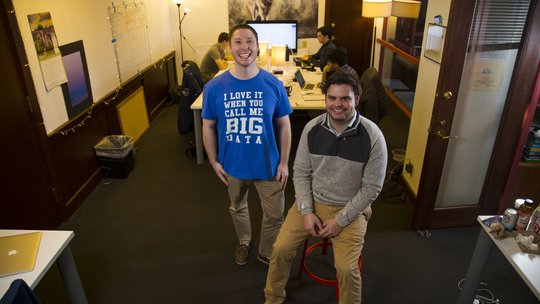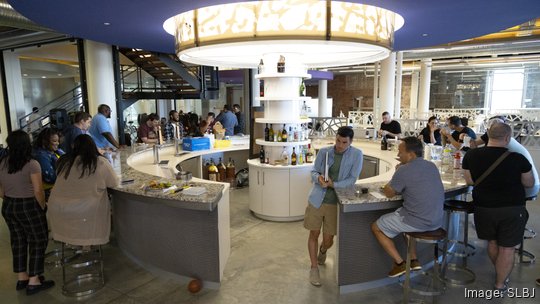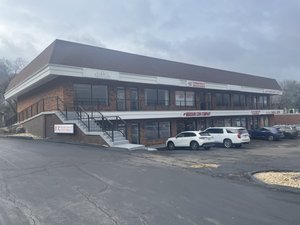It all happened so fast.
In October 2018, Balto, a St. Louis startup pitching software to make sales calls more effective, announced its first capital investment from investors: $1.2 million. It was less than two years since the firm was founded. It employed only 13 people.
Over the next four years, the company would become one of St. Louis' biggest startup growth stories, with no end in sight. By June 2022, it had amassed $50 million in investor capital, $37 million of which came in a single Series B round in August 2021. It had more than 160 employees and appeared to be on track to glide toward its most-coveted milestone: a $1 billion valuation.
“That’s not a six-month goal. It’s a 2025 goal, but that’s the goal,” Chris Kontes, a co-founder of the company, said after announcing the Series B round. "That's what we're building for."
Then the growth stopped.
Balto in June 2022 began cutting back its headcount, laying off dozens of employees across multiple rounds of layoffs. Today it employs only 60 people, and the sudden reversal from rapid growth to equally rapid retrenchment has been agonizing.
“It was so crushingly disappointing. It felt like a piece of me had died,” co-founder and CEO Marc Bernstein said in a recent interview.
Balto isn't alone among startups reacting to rising costs from inflation and a fallow venture capital market by slashing costs and hoarding cash. While rooted in pragmatism, the sudden polarity shift is jarring for founders like Bernstein, Kontes and Balto's other co-founder, Davidson Girard, on several fronts, from maintaining morale to recalibrating growth expectations with investors.
But how a startup navigates itself through times like this can say more about its long-term viability than any single product or good idea that got them to this point. It's the ultimate test for entrepreneurs: Can they lead an organization through periods of uncertainty?
At Balto, Bernstein said the layoffs put extra pressure on himself and the firm's other leaders to focus on company culture and to be up front with remaining staff about the challenges and sadness the layoffs would bring.
Its team my be 60% smaller, but Bernstein contends Balto is a better business today than it was as a fast-growing enterprise. The layoffs and cost-cutting measures helped it to refine operations, particularly around product development and sales, which are up nearly 150% from where they were.
That’s created a shift in the company’s mentality. Having once pursued growth at lightning speed, Balto today is content to be more measured.
“Balto has adapted to the reality that this is not a sprint, it's a marathon,” Bernstein said. “We are going to be committed to building the best company that we need for as long as it takes, and the speed that venture capital operates can push businesses to hit milestones that they're not ready for. We’ve as a company culturally aligned around the power and importance of incremental progress.”

A sales story
Before becoming entrepreneurs, Bernstein and Kontes worked in sales at TopOpps, a St. Louis-based developer of sales management and forecasting software.
Not unlike other professions, sales employees rely on coaching to improve their practice. Bernstein said at TopOpps, that took the form of listening back to his calls with a manager. It was informative, he said, but didn't necessarily improve results.
"He'd provide me great feedback, but then I'd get on my next call with a customer and forget to apply everything I had just learned. The insight was that it's one thing to know what you should do. It's another thing to do it live while you're talking with the customer," Bernstein said. "And if it's hard enough for one person to get this right 15 minutes after a coaching session, take this problem and scale it. Imagine you have 100 or 1,000 or 10,000 folks in a call center trying to serve your customers and generate revenue. You can imagine how much opportunity is getting left on the table."
The idea for Balto was borne from that experience.
Bernstein, Kontes and Girard, then in their mid-20s, launched Balto in 2017. The idea was to create a tool that provided real-time guidance to sales agents while on a call. It uses artificial intelligence technology to analyze texts from a call as it's happening. It can detect, for example, when a customer is angry, and prompts the sales or customer service agent with suggested responses and directions to use an empathetic tone. Balto says its technology can also alert a customer service agent’s manager while a call is live, allowing them to join the call and offer assistance.
Balto struck on a need, and investors followed suit. That includes both traditional venture capital, like St. Louis-based Cultivation Capital, private equity, such as Stripes, the New York-based firm that led the $37.5 million round in 2021, and strategic investors like RingCentral Ventures, the venture capital arm of Belmont, California-based business communications firm RingCentral (NYSE: RNG).
It's because of those investors and board members that Balto decided to dial back on growth.
Last year, as inflation continued to rise and venture capital investment began to slow from record highs in 2021, Bernstein said conversations swung from rapid growth to immediate cuts.
“We were one of the earlier ones to do a round of layoffs and that was hard, but [our board] had seen the story before and they said ‘guys, trust me, there's gonna be a point where you're really going to want to have as much cash in the bank as you can,’” Bernstein said.
Bernstein said Balto's decision to make cuts stemmed from a shifting model in what investors want from technology companies, from a focus on rapid growth to finding a path to profitability.
"The capital markets changed how they valued tech companies — rightly so — and for Balto to ensure we'd be properly financed in perpetuity, we had to adapt to the new times," he said.
Layoffs have come at other promising St. Louis technology firms too, including food technology firm Benson Hill, online learning company Nerdy and real estate startup Clever Real Estate.
Those cuts comes as venture capital investments in U.S. startups has fallen in six of the last seven quarters, well off from record quarterly highs experienced in 2020 and 2021. Investors funneled $36.7 billion to U.S. startups in the third quarter of 2023, down from $46.6 billion in the year-ago period and $83.7 billion in the third quarter of 2021, according to data from research firm PitchBook. Fewer deals are also being closed, with deal flow of 2,716 in the third quarter, off from 3,933 a year ago.
The funding landscape has led a number of startups to raise capital in so-called “down rounds,” financings that value a company at a lower rate than in previous funding rounds. Pitchbook’s data estimates 15% of funding rounds in the second quarter of 2023 were down rounds, the highest quarterly figure it has tracked since 2017.
“In 2021 capital was falling out of the sky. You could raise a seed round of several million dollars off just an idea two years ago. Obviously things have changed now,” said Vincent Harrison, venture capital analyst at Pitchbook. “The name of the game of the game right now is let’s just extend runaway as long as possible to outlast the market and see if we can raise in a time period that’s a little bit more friendly.”

It's 'going to suck for a while'
Balto did more than just cut costs. It also shifted its priorities.
In research and development, for example, the emphasis transitioned from churning out product after product to a more measured focus on products that might add the most value to the company and its customers.
Sales operations have also been recast. In the past, when the economy was stronger, Bernstein said Balto could be more flexible with its sales process, chasing opportunity for opportunity's sake. That included spending more on marketing, providing terms that allowed customers to more easily walk away from contracts and pursuing customers outside its target segments.
“Those are all the sorts of things you can do in a zero interest rate environment," Bernstein said. "But when you get to a little bit more of an austere environment, then you have to really lean into what excellent sales looks like."
Through an internal review of sales cycle data and customer feedback, Balto sought to refine its ideal target customer, determining its best route to success was through targeting firms in the financial services, insurance and home improvement fields.
As Balto shrunk, Bernstein said the company’s messaging around the cuts didn’t seek to sugarcoat the circumstances to the staff that remained. He said it was important to company leadership that it had to be upfront with employees that it’s “going to suck for a while.”
“I think the first, most important part is you need to expect it to be sad and difficult and frustrating for a while,” Bernstein said. "I think if you make cuts and then return to a positive tone a week later, it's not going to reflect the reality of what just happened. It's not going to reflect how people feel.”
The layoffs tested Balto’s culture, a point of pride since its launch in 2017. Bernstein said he knew Balto’s culture could be hampered by its layoffs, but figured honesty with employees would be key to keeping it intact.
“If you don't provide your company enough transparency people will come up with their own rationales for why you're making the cuts you're making,” he said.
Missing the 'playoffs'
For Bernstein, the layoffs also took a toll on him personally. They required him to balance the demands of making decisions necessary for the business while grappling with the human element of layoffs. And they cut at the ambition of Balto and its goal of eventually becoming a unicorn startup valued at $1 billion.
“You think about the person who had a bunch of career ups and downs and finally came to Balto and found a place they really loved and was a great culture fit, but maybe wasn’t contributing the right type of value the company needed at that time,” Bernstein said. “You think about all of the individual stories and you don't forget that that resonates with you.”
Glen Dall's been there himself.
Dall is an executive coach, but before that he was CEO of Minneapolis-based Insignia Systems Inc. (NASDAQ: ISIG), a provider of in-store advertising and display marketing tools where he oversaw staffing cuts that impacted about a third of the company’s staff.
“That was pretty painful, but it’s what we had to do for the business,” said Dall, CEO of Apex North Business Coaching.
Today, Dall helps CEOs navigate difficult decisions. He said it's important for CEOs to remind themselves that tough decisions have to be made with a longer-term view.
“Hopefully a CEO wants to build a company that’s going to be here a long, long time and be a really great company for a long time. If they think that way, then what they're doing right now is ensuring the longterm survival of the company for all those stakeholders,” Dall said. “If a CEO doesn’t make those tough decisions, they could run the company into the ground.”
Bernstein leaned on an executive coach of his own, Alex Auerbach, to navigate the changes at Balto.
“I asked him, 'what happens when you're working with a team and the team is doing really well, and then they blow a couple critical games and they know they're gonna miss the playoffs? What do you do?,'” he said.
The coach told Bernstein to look for meaning elsewhere beyond the layoffs and cuts, to seek out small wins and opportunities to better understand his team and business.
“We took that period of ‘missing the playoffs’ as a time to regroup," he said. "And we did. We started the next season.”
Growing again
The disappointment Bernstein once felt as Balto made layoffs has turned into a new emotion: Surprise.
Bernstein didn’t share specific figures, but said Balto has beaten its sales goal for four consecutive quarters, with sales up 148% year over year. He said the layoffs allowed Balto to better focus on where it had the most opportunity for growth, without having resources compete against each other within the company.
“I continue to be surprised by how making these changes really does improve business performance,” he said.
The sales growth comes from both signing on new customers as well as expanding deals with existing customers as Balto has developed new products, Bernstein said. Balto has shifted its pricing toward providing an all-in-one platform — a suite of technology products instead of offering them a la carte.
“I think that's what buyers really want now because they can't keep up with all the AI products, it's too much. They just want to partner with a technology vendor that they know has the things they want today, and is going to probably build the things that they didn't know they want tomorrow,” Bernstein said.
Bernstein said macroeconomic conditions, like inflation and venture funding, make it challenging to determine right-sizing for a company, but said he feels comfortable with Balto’s current operations. Even more important, the company can achieve its goals without needing to wade into a less-than-ideal market in search of capital.
“What I can say though is that with our current size and the growth we're seeing, we will be able to achieve profitability with the cash we have or very close to it.”
It’s not just Balto that’s experienced growth out of its layoffs. Bernstein said he feels wiser and more competent as a leader after the experience. And he is confident the decisions Balto made, while difficult, have positioned the company for sustained growth, noting it still has capital on hand from its Series B funding round in 2021.
“If we hadn't made cost cutting decisions as early as we did, we might not be in as healthy of a position,” Bernstein said.
TIMELINE
January 2017 — Balto is incorporated, founded by Marc Bernstein, Chris Kontes and Davidson Girard
October 2018 — Balto raises $1.2 million in a seed funding round. Headquartered in the T-Rex incubator, Balto has 13 employees.
November 2018 — Balto wins a $50,000 grant from St. Louis nonprofit Arch Grants as part of its 2018 class of investments.
September 2019 — Balto raises an additional $3 million in seed funding, with investors including St. Louis-based venture capital firm Cultivation Capital. It plans to double its team of 25 employees.
October 2020 — Balto raises $10 million in a Series A round, bringing its total capital raised to $14.2 million. It has 45 employees, saying it hopes to grow that figure to 100-plus by the end of 2021.
August 2021 — Balto raises $37 million in a Series B round. It has about 110 employees. It also inks a deal for a 23,000-square-foot headquarters at 1227 Washington Ave. in Downtown West.
June 2022 — Balto, which has grown to include more than 160 employees, lays off about 30 employees. The layoffs included a range of different positions, including roles in sales, customer support, engineering and recruitment
December 2022 — Balto makes another round of layoffs, affecting at least 35 employees.
November 2023 — Balto says sales have increased 148% over 2022, thought it didn't provide exact figures.












